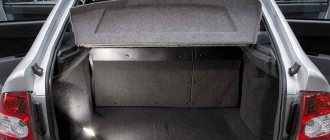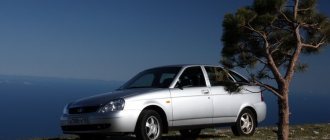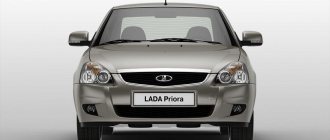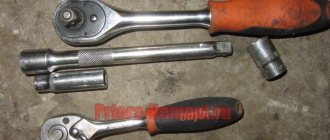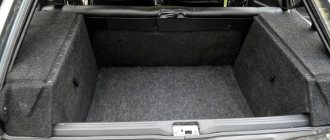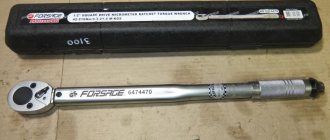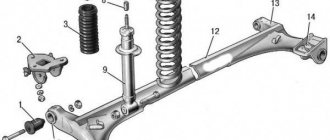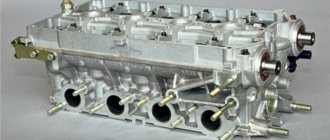Dimensions
The Lada Priora with a hatchback body has the most “modest” dimensions in its series. The length of the five-door version is only 4.24 meters, the three-door version is slightly shorter - 4.21. The height parameters are average, in comparison with the low-set sedan and the high “station wagon” - 1.43 meters.
The width is the same as other body types - 1.68 meters. Almost all versions have a clearance height of 16.8 centimeters, with the exception of the “Sport” line, where it is slightly lower.
Weight of LADA Priora
The carrying capacity of the VAZ Priora I 1.8 MT sedan is 490 (kg).
Weight of popular modifications:
Curb weight of LADA Priora modifications of different generations:
- VAZ Priora I 1.6 MT sedan (2007 - 2013): 1088 (kg) 1578 (kg).
- VAZ Priora I 1.6 MT hatchback (2008 - 2013): 1088 (kg) 1578 (kg).
- VAZ Priora I 1.6 MT station wagon (2013 - present): 1185 (kg) 1593 (kg).
- VAZ Priora I 1.8 MT sedan (2014 - present): 1088 (kg) 1578 (kg).
The value of the permissible gross vehicle weight is indicated in parentheses.
Car load capacity:
The arithmetic difference between a vehicle's gross vehicle weight and its curb weight is the vehicle's payload capacity. For example, for the VAZ Priora I 1.8 MT sedan, the load capacity is determined as follows:
Important: the VAZ Priora I 1.6 MT station wagon is one of the heaviest cars in the model range, its curb weight is 1185 (kg), and the total permissible weight is 1593 (kg).
The head car of the family of Russian cars of the III group of small class LADA Priora is the VAZ-2170.
Engine after restyling
Coming off the assembly line in 2007, the car was equipped with 1 of 3 engines that were released gradually. Technical characteristics of LADA Priora 2010 look like this:
- Engine with 8 valves and 81 hp. At peak it produces 171 kilometers per hour, which was not bad at the time of release. Many drivers complained about inefficient fuel consumption: 7.5/100. Versions with this engine cost less than others, but they also ate much more gasoline.
- The 16-valve engine had 89 horsepower and could reach up to 176 kilometers. Fuel consumption is lower - 7.2 liters. In general, this medium engine was installed on the Optima version.
- The most “Top” version was equipped with an engine with 16 valves and 98 horsepower. It could accelerate 183 kilometers and consumed 7.4 liters.
Please note that now it makes no sense to buy cars produced before restyling. Buying spare parts can cost a pretty penny.
Characteristics of Priora hatchback
| Engine | 1.6 l, 16-cl (Euro-3) |
| Length, mm | 4210 |
| Width, mm | 1680 |
| Height, mm | 1420 |
| Base, mm | 2492 |
| Front wheel track, mm | 1410 |
| Rear wheel track, mm | 1380 |
| Luggage compartment volume, dm 3 | 400 |
| Weight in running order, kg | 1088 |
| Gross vehicle weight, kg | 1578 |
| Permissible total weight of a towed trailer with brakes, kg | 800 |
| Permissible total weight of the lettered trailer without brakes, kg | 500 |
| Wheel formula/drive wheels | 4x2/front |
| Car layout diagram | front-wheel drive, front engine, transverse |
| Body type/number of doors | hatchback/5 |
| engine's type | gasoline, four-stroke |
| Supply system | Electronically controlled distributed injection |
| Number and arrangement of cylinders | 4, in-line |
| Engine displacement, cm 3 | 1596 |
| Maximum power, kW/rpm | 72/5600 |
| Maximum torque, Nm at rpm | 145/4000 |
| Fuel | unleaded gasoline AI-95 (min) |
| Fuel consumption by driving cycle, l/100 km | 7,2 |
| Maximum speed, km/h | 183 |
| Transmission | With manual control |
| Number of gears | 5 forward, 1 reverse |
| Main gear ratio | 3,7 |
| Steering | rack and pinion type, electric power steering |
| Tires | 185/65 R14 86(H) 175/65 R14 82(H) 185/60 R14 82(H) |
| Fuel tank capacity | 43 |
Engine after restyling
The technical characteristics of the Lada Priora hatchback have changed somewhat after restyling in 2013. In the new version only 2 engines were released:
- In the younger model, the engine has become more economical (consumption of only 6.9 liters), with increased power - 98 horsepower. Maximum acceleration is 183 kilometers.
- In the older version, the engine became more powerful - 106 horsepower, but with the same speed characteristics. Consumption dropped to 6.8 liters.
Technical characteristics of Lada Priora hatchback 1.6 liter 8v 5-speed manual transmission
| Motor power | 87 hp |
| Torque | 140 Nm |
| Acceleration to 100 km/h | 12.5 s |
| Max. speed | 176 km/h |
| Fuel type | AI-95 |
| Consumption in the city | 9.9 l |
| Highway consumption | 5.7 l |
| Mixed flow | 7.3 l |
| Volume of the tank | 43 l |
| Trunk volume | 360 l |
Body
In all versions of the Priora, the bodywork is mediocre. Drivers and experts had 2 complaints:
Susceptibility to rust. The body is made of ordinary steel, without alloying additives. For this reason, after the first winter it begins to actively rust and it will not be possible to stop this process.
Poor paintwork. Some noticed that it began to fall off in large “chips.” You will have to constantly visit the paint shop to paint over them, otherwise the corrosion process will be unstoppable.
Test Drive
A hint of respectability
Despite the fact that in terms of body dimensions, the Priora is virtually identical to the Ten, it looks larger.
This optical illusion was achieved thanks to lighting optics located at the corners of the body, as well as due to its more convex front part. In general, the Russian “state employee” looks harmonious and, to some extent, even representative.
Transmission
Initially, the hatchback came with a manual transmission. In fact, it was a strengthened version of the gearbox from the 110th Lada. Drivers immediately noted the poor quality of the mechanics, which became known for having very poor synchronizers. Often the handle simply “jumped” out of gear or the desired mode simply did not turn on.
The release lever began to knock just 3 months after purchase, and unclear shifts were observed immediately from the passenger compartment.
Subsequently, the restyled version of “2180” received updated mechanics, which worked much smoother. The sudden knocks disappeared and shifts became smooth. Afterwards, AvtoVAZ updated the gearbox and installed a robotic version, which received mixed reviews. However, it is very reliable and convenient; there are no reviews about its inoperability.
Disadvantages, breakdowns and problems of Lada Priora 2172
Body
The body is highly susceptible to corrosion and rust may appear after the first winter. The paintwork is not the most durable; chips form quickly and immediately turn yellow.
Salon
The interior is very cramped, especially in the back, and there are a lot of ergonomic miscalculations. Noise insulation is weak, squeaks appear from the first km and only intensify with mileage.
But most of all the problems are caused by electrics; something constantly breaks down. This is some kind of endless process, you fix one thing and immediately something else breaks.
Engine
Four 1.6-liter engines have similar problems, let's list them in a single list:
- Sensors often fail, and in updated internal combustion engines there is an electronic throttle valve
- The thermostat may unexpectedly jam, which will lead to overheating and gasket breakdown
- Lubricant leaks regularly occur, as well as fogging of the crankcase ventilation breather
- The worst thing is a broken timing belt due to old age, jammed rollers or pump
Transmission
The main manual transmission of the VAZ 2170 is a reinforced version of the manual transmission from the Lada 110 and is known for weak synchronizers, release knocks and unclear shifting.
The new mechanics of the VAZ 2180 with a cable drive are much more pleasant to use. The VAZ 2182 robot received very mixed reviews, read a separate article about it.
Suspension
But there are much fewer questions regarding the chassis of the car. The suspension here is quite reliable; by 100,000 km, steering tips, wheel bearings, and ball joints are usually replaced.
The brakes are not bad if you buy normal pads instead of the stock ones as soon as possible. The first years of production there were failures with the electric power steering, but then everything got better.
Technical modification data
The modification is a good budget car. It belongs to class B and has a high degree of environmental friendliness - Euro4.
How much does a Hatchback body weigh? In factory configuration, without load, its weight is only 1088 kilograms.
Compared to other versions of the Priora, the suspension was not strengthened here. The front spring remained independent, and the rear was partially independent. The front brake is ventilated and has a disc locking type, the rear brakes are drum brakes. The use of a robotic automatic transmission in the modification made the car “friendlier” and easier to drive, even for inexperienced drivers.
The headlight glass has been changed in many ways to better distribute light. The body, interior, steering wheel and multimedia devices were also slightly changed.
Appearance
Currently, tuning for VAZ cars has a wide range of choices. Since Russian-made cars are quite inexpensive, this attracts their buyers. Tuning for Lada cars is also available and can be found in almost any city.
Tinted glass
To give your car a beautiful appearance, the first step is to tint it. Car tinting is relatively inexpensive, ranging from 2,000 to 3,000 rubles. But after tinting, your car will shine with new colors. It is legally possible to tint car windows only from the rear. Since the light transmittance of the film is not so high, viewing in the evening will be difficult.
Lip installation
To give the car a stylish look, you can install a lip on the front instead of the standard fangs under the bumper. There are several types of lips. The rubber lip “Samurai” and the plastic lip from the Chevrolet Cruze fit perfectly on the Priora bumper. The lip should be secured under the bumper with self-tapping screws. The price of the lip is from 500 to 1000 rubles.
Guba Cruz
Lip Samurai
Lipspoiler
In the days of the nines, when our fathers raised the rear of the car by installing spacers under the rear shock absorbers and installing huge spoilers like in Need For Speed. Nowadays, it is stylish to lower a car; by the way, you can read how to properly lower a car on our website, and install a small spoiler that is glued to double-sided tape. The price of such a spoiler varies within 1000 rubles.
Alloy wheels
Everyone knows that the wheels of a car are the floor of the car, so the wheels of your car should be beautiful and you like them. On the Lada Priora you can install wheels with a radius ranging from R14 to R17. When installing R16 and R17 wheels, you will have to buy low-profile tires, which is very expensive and not practical, but at least beautiful. When installing disks with a large radius, comfort is lost and the chassis begins to work rougher since the rubber does not “eat up” minor road irregularities.
It is best to install R14 and R15 wheels. Such wheels are relatively inexpensive and the tires for such a radius are high profile. It follows that the comfort of driving a car will not be lost.
SE caps and mirror repeaters
In order to give your car a little luxury, you can install turn signal indicators in the prior mirrors and turn signal plugs in the wings on the SE. This modification is relatively expensive, but it significantly changes the appearance of the car and gives it a certain “richness”.
Sabers and bars
This is an amateur modification and is most often suitable for cars with a dark body color. The rear chrome-plated trunk saber and the front chrome-plated hood saber are painted matte black. This modification is very cheap and simple, but it has its own zest and is relevant when the chrome on sabers begins to swell, which is very common on Priors.
Antishildik
This modification consists of removing all nameplates from the car, but it also falls under the category of amateurs. Some car enthusiasts like their cars to look like they came from the factory. The nameplates must be removed using a hairdryer; they are glued with double-sided tape. After removing the nameplate, the remaining tape must be removed with gasoline or solvent.
Technical characteristics of Lada Priora Hatchback 1.6 MT 98 hp
Main characteristics
| Brand | VAZ |
| Model | Lada Priora Hatchback |
| Modification | Lada Priora Hatchback 1.6 MT 98 hp |
| Model year | 2013 |
| Body type | Hatchback |
| Number of doors | 5 |
| Number of seats | 5 |
| Country of assembly | Russia |
Performance characteristics
| Type of fuel | AI-95 |
| Acceleration time to 100 km/h | 11.5 sec |
| Maximum speed | 183 km/h |
| Fuel consumption in the urban cycle | 9.1 l per 100 km |
| Fuel consumption on the highway | 5.5 l per 100 km |
| Combined fuel consumption | 6.9 l per 100 km |
| Power reserve | 473 – 782 km |
| Fuel costs per year (with a mileage of 100 km per day) | 119 629₽ |
| Transport tax * (Moscow) | 1 176₽ |
| OSAGO * (Moscow, age over 22 years, experience over 3 years) | 7 570₽ |
Dimensions and dimensions
| Length | 4210 mm |
| Width | 1680 mm |
| Height | 1435 mm |
| Ground clearance | 165 mm |
| Front track | 1410 mm |
| Rear track | 1380 mm |
| Wheelbase | 2492 mm |
| Turning diameter | 11.6 m |
Weight
| Curb weight | 1163 kg |
| Full mass | 1578 kg |
| Load capacity | 415 kg |
Volumes
| Trunk volume | 360 l |
| Fuel tank volume | 43 l |
Engine
| engine's type | Petrol |
| Number of cylinders / arrangement | 4/Inline |
| Engine power, hp/rpm | 98/5600 |
| Engine displacement | 1596 cm³ |
| Torque, Nm/rpm | 145/4000 |
Transmission
| Drive unit | Front |
| Gearbox type | Mechanical, 5 gears |
Steering wheel
| Power steering | Electric booster |
Climate
| Climate control | Climate control |
Suspension
| Front suspension | Independent, McPherson |
| Rear suspension | Semi-independent, lever |
Brakes
| Front brakes | Disk |
| Rear brakes | Drums |
Tires and wheels
| Tire size | 175/65 R14 |
Trailer
| Trailer weight / braked | 500/800 kg |
